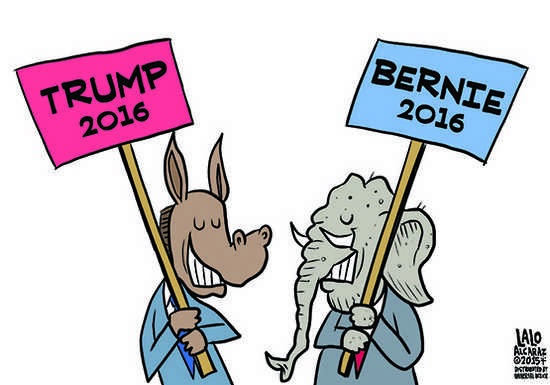By Josep Colomer.
The participants in the Democratic primaries have been 44% of Obama’s voters in the presidential election four years ago. The participants in the Republican primaries, 50% of Romney’s votes four years ago.
Hillary Clinton has received 13% of the total number of votes in the 2012 presidential election. The Donald, only 10%.
And please, don’t even look at electoral survey polls five months before the election!
Abolish the Primaries!
A Debate
About 15 years ago, I published a critical analysis of the primary election method to select candidates for President, as they were used by then for the first time in several Latin American countries. My basic point was that the winners in primaries were not the most ‘electable’ candidates, as shown at the time by the worsening performance of parties adopting the primary system and some asymmetries within the same country between parties that used primaries or not.
I received numerous comments, citations, supports and replies, including the one by John Carey & Harry Enten which is included in my edited book Personal Representation: Basically, some colleagues praised the higher opportunities offered by the primaries for pre-candidates to get public exposure and be scrutinized by the voters, which should result into a more informed selection of candidates. Now, after the U.S. long season of primaries… well, we know.
In front the weird show that we had to suffer during the last few months, two basic alternatives exist: abolish the primaries or change the primary’s voting rules.
-
1) Abolish the primaries would return the parties to what they typically are and ought to be: voluntary associations of political entrepreneurs to promote policy and candidates in competitive elections at their own risk.
The peril of a political party system is, of course, that it can make the ideal of being ruled by the few best –the classical ‘aristocracy’— to degenerate into ‘oligarchy’, as was clairvoyantly pointed out by Robert Michels more than a hundred years ago and has been more than confirmed since then. But we also know that mass democratic participation –such as the one supposedly promoted by primary elections– can degenerate, in turn, into ‘demagoguery’. And as Aristotle observed, demagoguery or “the mob rule” is the worst type of government, as the demagogue tends to become a tyrant. The insight fits the current dilemma in the U.S pretty well.
-
2)The other alternative is to proceed with incremental reforms. Changing the voting rules in the primaries may provide some immediate betterment and be also, perhaps, a first step towards more encompassing party reforms.
During the last few weeks, several proposals for using alternative voting rules have been openly discussed: pairwise comparisons of candidates, approval voting, and variants of rank voting. Any of these alternatives would move the participants in the primaries to be more thoughtful, careful and better-informed at voting than the current system with a single categorical ballot for only one candidate does. The winners should be more consensual, thus making the parties closer to fulfill the ideal of the rule by the best.
ALTERNATIVES
Pairwise Comparisons
Nobel laureates Eric Maskin and Amartya Sen suggest that if voters had compared all candidates by pairs (as with the so-called Condorcet voting system), The Donald would not have won the Republican primary. The Republican winner, in their simulation, would have been John Kasich.
‘How Majority Rule Might Have Stopped Donald Trump’:
Rank voting, Approval voting
Economist Justin Wolfers makes the point that it’s the emergence of a new populist dimension with an outsider anti-establishment candidate that makes the outcome unpredictable.
‘Unusual Flavor of GOP Primary Illustrates a Famous Paradox’, NYT:
Journalist Kathleen Parker discusses what could have happened if the Republican party had used either the rank-order count, which makes voters rank all candidates (as designed by Cusanus and Charles De Borda), or the approval voting, which permits voters to select as many candidates as they find acceptable (as devised by political scientists Steven Brams and Peter Fishburn). Again, John Kasich would have likely won.
‘After Trump, the GOP May Need a Better Voting System’, WPost:
And Steven Brans makes his point.
‘Merits of Approval Voting’, NYT:
Majority Judgment
Mathematicians Michel Balinski and Rida Laraki promote a method of their invention, which drives voters to judge the potential presidency of every candidate as Great, Good, Average, Poor, or Terrible, and then compare the least judgement given to each candidate by a majority of voters. By using a Pew poll with analogous questions, they found that John Kasich and Bernie Sanders were “first in the nation’s esteem”.
‘Proof that US Voting System Doesn’t Work’:
The debate is open!



